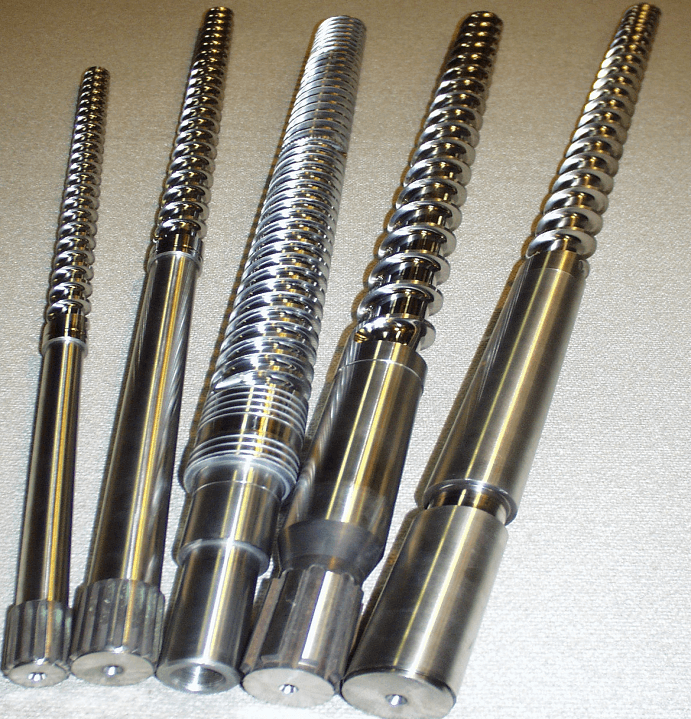Types of Feed Screw Materials
Your specific applications and needs utilize different types of plastics, from general purpose resins to filled engineered resins, abrasive and/or corrosive, whatever the combination will determine which screw material is best for production. From general purpose to high wear or corrosion, by matching your feed screw material to the characteristics of the plastic, you can further your feed screw’s durability and function, increase longevity and minimize problems all while improving the quality and consistency of the final part product.
Some common materials used for molding machine feed screws include:
1. Alloy Steels
Alloy steels have very high yield strengths and low costs. However, they don’t offer much abrasion or corrosion resistance, so they often receive welded hard-surfacing and root treatments such as nitriding and chrome. Our alloy steel feed screw options include American Iron and Steel Institute (AISI) 4140, 4150 and 4340.
Treated alloy steel offers excellent mechanical properties, especially for enhancing the strength and longevity of screws. It is ideal for injection molding screws with deep flights and smaller diameters and those used in high-stress applications. Alloy steel feed screws have a wide range of applications, from general-purpose molding to specialized processing, such as:
- Mixing and molding various plastics, including those with fillers or reinforcements.
- Operating in high temperatures and corrosive environments.
- Processing specialty plastics like glass-filled or mineral-filled resins.
2. Stainless Steels
Stainless steel feed screws have good corrosion resistance and high yield strengths, with our 17-4PH and 51-5PH options sporting higher yield strengths than most alloy steels. However, wear resistance is poor, so many stainless steels are heat-treated or hard-faced welded to provide protection from corroded internal threads. We offer feed screws for molding machines in the 300 and 400 series, as well as the 17-4PH and 15-5PH options. Specialty steels such as Hastelloy C-276 and Duranickel are also available for extremely corrosive materials.
Stainless steel is a versatile material that can be treated and adjusted to various strengths and resists corrosion and wear. Below are our stainless steel feed screws and some of the applications they are used for:
- 17-4PH feed screws: These screws have a high strength hardness of up to 45 on the Rockwell Hardness C scale (HRC) and good corrosion and wear resistance. Their applications include high-pressure molding and processing medical- and food-grade plastic.
- 15-5PH feed screws: These are similar to 17-4PH feed screws, with a lower carbon content and better corrosion resistance. They are used for processing moderately abrasive polymers, precision molding, and applications requiring dimensional stability.
- 300 Series feed screws: Austenitic stainless steel offers excellent corrosion resistance and good formability. These feed screws are used for applications where contamination must be minimized, including chemical, pharmaceutical and medical plastic processing.
- 400 Series feed screws: These screws are considered martensitic stainless steels, which can be heat treated to a strength hardness of up to 58 HRC. They are used in high-wear applications, handling of abrasive fillers and reinforcements.
- Hastelloy C-276 feed screws: Their specialized steel offers exceptional resistance to harsh environments and maintains its properties at high temperatures. They are ideal when processing highly corrosive and aggressive polymers and handling halogens and acidic compounds.
- Duranickel feed screws: These screws have age-hardening capabilities and great mechanical properties at higher temperatures. They are used for processing corrosive polymers, elastomers and resins with aggressive additives.
3. Tool steels
Once heat-treated, tool steel feed screws provide high abrasion resistance and better corrosion resistance than alloy steels but have a very low yield strength. Small screws are more affordable and a very good choice when abrasion and corrosion resistance is needed. On large screws, the cost of materials, heat-treating, and machining can make them quite costly, but should still be considered for specific applications. We carry injection molding feed screws with AISI S-7, D-2, M-2, H-13, CPM-9V and CPM-440V materials.
Each material offers different levels of abrasion and corrosion resistance for varied applications:
- AISI S-7 feed screws: They can be treated to achieve hardness levels of up to 60 HRC and are used for processing tough and abrasive materials.
- D-2 feed screws: These feed screws are highly resistant and offer great edge retention. They are used for general-purpose molding applications.
- M-2 feed screws: These screws are used for applications requiring high hardness and are suitable for processing high-performance polymers.
- H-13 feed screws: H-13 tool steel offers excellent toughness and thermal stability. H-13 feed screws are used in die casting and extrusion processes and high-pressure molding.
- CPM-9V feed screws: They offer great wear resistance and toughness and are used for high-performance applications.
- CPM-440V feed screws: These feed screws are wear and corrosion resistant and are used for medical grade molding applications.



